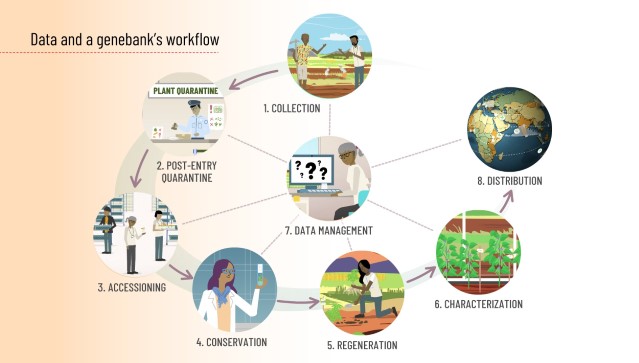Keeping records
This course is primarily concerned with science, not management. However, it is worth remembering that you are part of a community of scientists, who all play a part in a chain of processes in which genebanks receive and store germplasm, and make sure it is available as part of the global system of plant genetic resources for food and agriculture (PGRFA), to be used by breeders to develop new varieties.
At every stage, information is added about the accession. For instance, when you carry out characterization or viability testing, and record your results, other scientists will be able to benefit from the knowledge you have generated. Figure 3 (below) shows the central role a data management system plays in the flow of germplasm and associated information through a genebank.

Look at Figure 3 and identify which processes you are involved with in your work. What information do those upstream of you in the process give you about the seeds they pass on to you? Now consider what information scientists further downstream would find useful, alongside the PGRFA you supply them with.
Data management can be overlooked in some national genebanks where resources are scarce, but this interdependency of genebank operations means that a robust information system is crucial. If you would like to find out more about data management, a new CGIAR course is being developed on this topic.
Activity 3: Useful data
Allow five minutes for this activity.
Every genebank process generates useful data. Use the note-writing box below to reflect on what kind of information it would be useful to record from a process such as collection, characterization, viability testing, regeneration or storage.
Once you have thought about it yourself, click on 'reveal' below to show our suggestions:
Discussion
| Process | Data |
Collecting in situ |
Donor or origin Taxonomy Habitat Status Passport data
|
Characterization |
Trait information Germination behavior
|
Viability testing |
Viability tests used Results Seeds used
|
Multiplication and regeneration |
Seed quantity Cultivation Location Dates
|
Medium term storage |
Location Quantity Recipient(s) Seeds sent
|
The Seed Information Database
